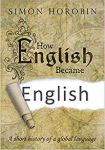How English Became English: A short history of a global language by Simon Horobin
| How English Became English: A short history of a global language by Simon Horobin | |
|
| |
| Category: History | |
| Reviewer: John Lloyd | |
| Summary: A concise and readable look at the language this site is written in, even when we greatly veer from Standard English or engage in txt spk. | |
| Buy? Yes | Borrow? Yes |
| Pages: 192 | Date: January 2016 |
| Publisher: OUP Oxford | |
| External links: Author's website | |
| ISBN: 9780198754275 | |
|
| |
Angle se yon lang konfizyon. Mwen konnen, paske mwen li liv sa a tout sou li. Now, I know a lot of you understood that, and it's thanks to a certain search engine's 'translate' facility that it exists here in the first place, but hardly any of you would recognise it as Haitian Creole. But pretty much all of the words in the two sentences have come into English through one way or another, through an invasion either literal or lingual. Angle – the Anglo-Saxons were the first speakers of what we now call Old English, which is pretty much impenetrable – certainly harder to read than Creole. The konfizyon in the language are equally easy to decipher, and the second half is pretty close to the French with what seems a German verb in it. If you do use regular English, that's what you're doing – using French with some German, and Latin, and Indian, and the rest, even if that's only as far as vocabulary goes; our grammar is too Germanic to be called anything but. It's at this stage one reels out the old gag about English being the 'lingua franca' and thus proves that however global English is, it doesn't really stand as its own entity if you give it the slightest scrutiny.
Except that last is quite the nonsense it was designed to be. There is an affirmed, affirmative English – it just seems you have to go in search of it these days. I well remember my primary school teacher having me up for questioning the spelling of the hard 's' sound at the end of certain words – things seemed at the time to be on the edge of being standardized into, er, standardised. But nobody ever really had the agency to make that the case. There has never been an English version of the Academie Francaise – and lawks help us if the Americans ever manage to set one up. Dictionaries all say they're describing the language, not stating one use is correct over another, and style guides, while they do claim to be the be-all and end-all of usage guides, well they never agree often enough to live up to that.
All these subjects and more are featured in this book, which looks small but covers a lot of ground. We start with the history of English, and the tale is a three-way mesh of grammar, vocabulary and spelling, and to some extent punctuation, as influences came and went – quite literally, as some distant regions of the world have stuck with old uses of English we here have long since evolved past. (It was we who made the change from fall to autumn, not them going the other way round, and I only recently heard a similar claim for aluminum being the older term.) The book then swings through the ideas of setting the language in stone (setting it in print first helped there, obviously), the standardised form (public schools only abetting what was looking like being the standard, RP type of usage with its focus on the tongue of the court, church etc.), and so on (he said, dropping in a perfectly-placed Oxford comma).
Before the heinous Internet- and text-based buggeries of the language come up, the book comes down firmly on the side of dialect, cultural differences away from the Standard English norm and pidgin tongues as good things. Horobin seems quite generous to me in looking at digital communication, repeatedly saying the rapidity and need for concision are demands of the cybersphere that cause a fresh look at the old language. I know that I would much rather celebrate RP's 150th birthday in 2019 than the centenary of OMG in 2017.
Only once, however, does the book mention an over-fondness for correction, and it wasn't the kind I thought it would. My limited use of audiobooks was where I heard one of the country's more erudite and intelligent, classically-educated people narrate On the Origin of Species, but audibly dump a third n into canine, making it sound like something that had been tinned. So it's certainly not just the spotty youth and her keyboard or smartphone that seems to be changing our language – either that or I missed the news that people were trying to revoke what I now know to call the Great Vowel Shift.
The very word grammar may raise the hackles of many potential readers, but I don't think you really need an in-depth knowledge before opening these covers; I hated the subject ('It shows, John', I hear you cry) and think I succeeded in understanding things. If anything, however, the book does have a little dryness to it. It's at that mark where you are happy to have read it, but not overwhelmed by anything. The best non-fiction, I maintain, is where the subject is one you didn't expect to find such enjoyment as you did, and the author's company and knowledge were clearly the best one could choose; this book was as good as expected, for sure, but no more. But it certainly got me thinking on an unusual (for me) topic for several hours, even if my conclusions didn't change. Like I said at the beginning, English is a confusing language. I know, because I read this book all about it. And I was very happy to.
I must thank the publishers for my review copy.
The Story of English by Joseph Piercy is a different approach entirely to more or less the same subject. You should seriously think of pepping your English up in a most un-Standard way with the help of The Horologicon: A Day's Jaunt Through the Lost Words of the English Language by Mark Forsyth.
This method is used to teach students English. It is something other than something used in business. Business English speaking is different and has a different flair. To learn what business English is all about, click here to access a business English course.
Please share on: ![]() Facebook,
Facebook, ![]() Twitter and
Twitter and
![]() Instagram
Instagram
![]() You can read more book reviews or buy How English Became English: A short history of a global language by Simon Horobin at Amazon.co.uk Amazon currently charges £2.99 for standard delivery for orders under £20, over which delivery is free.
You can read more book reviews or buy How English Became English: A short history of a global language by Simon Horobin at Amazon.co.uk Amazon currently charges £2.99 for standard delivery for orders under £20, over which delivery is free.
![]() You can read more book reviews or buy How English Became English: A short history of a global language by Simon Horobin at Amazon.com.
You can read more book reviews or buy How English Became English: A short history of a global language by Simon Horobin at Amazon.com.
Comments
Like to comment on this review?
Just send us an email and we'll put the best up on the site.


